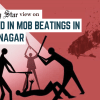Why can’t mob violence be contained?

That mob violence continued unabated through March highlights, once again, the dangers of the business-as-usual approach the government appears to have adopted in response to this troubling trend. In fact, data from the human rights platform Manabadhikar Shongskriti Foundation (MSF) show that mob beatings more than doubled within a month—from 18 incidents in February to 39 in March. The number of people killed in such attacks also surged, from 8 to 13. While these estimates are more or less consistent with other recent crime figures, the picture that emerges in relation to mob violence is quite concerning.
In one particularly disturbing incident early Sunday last week, Riyad, an Uber driver in Dhaka, was beaten to death after being falsely accused of being a mugger. According to his wife, he was taking a passenger from Pallabi around 2:00am when another car hit his vehicle from behind. As he stepped out to confront the driver of that car, its passengers shouted "mugger", prompting locals to beat him up. "He bought his car for Tk 16 lakh just a couple of months ago… Would a mugger buy a car for Tk 16 lakh?" his wife asked. Similarly, in Narsingdi, two brothers were killed by a mob on Monday night following an altercation with local autorickshaw drivers. These incidents serve as a stark reminder of the ease with which criminals disguised as common men are perpetrating such attacks.
The question is, why can't the government contain mob violence? What makes a section of the public feel so emboldened that they can take the law into their hands and execute "punishment" for perceived injustices? MSF has analysed the various motives leading to such attacks. Among them, suspicions of crimes including theft, robbery, mugging, extortion, rape, smuggling, and drug peddling often resulted in deadly violence. Sometimes, murder suspects were targeted. Political and personal grudges were also flagged as frequent drivers of mob violence. For instance, around the same time Riyad was killed, a man was beaten to death in Shariatpur for allegedly asking two youths to stop smoking in public. Such a broad spectrum of motivations shows how easily mob violence can be incited, and executed, in the absence of effective deterrents.
This must be changed. This trend, which saw a surge after the political changeover in August, owes primarily to two reasons: first, the inability of law enforcement to act decisively and identify or detain those involved in mob violence, and second, the failure of the judiciary to ensure proper punishment. We urge the government to address these systemic issues with utmost priority.


 For all latest news, follow The Daily Star's Google News channel.
For all latest news, follow The Daily Star's Google News channel. 










Comments